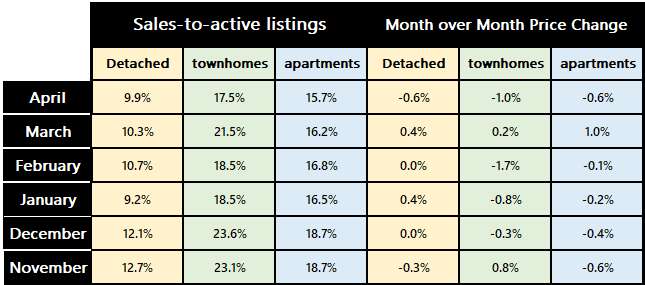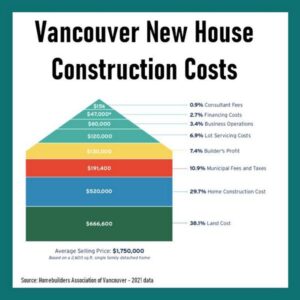Welcome to the April Metro Vancouver Real Estate Market Update. I hope you had a wonderful Mother’s Day with your mom.
By most metrics, April was a weaker month for real estate compared to March. The only figure that showed improvement was sales—still 28.2% below the 10-year average, but slightly better than March’s 36.8% below average. While this is hardly a “bright” spot, it was the only metric to show any improvement. Beyond that, conditions worsened. New listings rose to 19.5% above the 10-year average, bringing the total number of active listings to 47.6% above the norm. This is clearly a buyer’s market.
As shown in the table below, the sales-to-active listings ratio declined across all property categories. This ratio is a key indicator of supply and demand: the higher the ratio, the greater the demand. Historically, when this ratio stays below 12% for a prolonged period, it places downward pressure on prices. Unsurprisingly, prices declined month-over-month in all categories.

Looking ahead, I don’t see many bright spots in the coming months. While a baseline level of activity will continue—driven by life events such as family formation, separation, job relocation, and death—any additional market activities will remain weak. Ongoing uncertainty over tariffs is making people hesitant to make the largest investment of their lives. A recent example is the unexpected announcement of 100% tariffs on films produced outside the U.S. In 2022, Vancouver’s film industry employed 26,000 people and generated $2.7 billion in GDP. How many of those 26,000 workers will feel comfortable taking on hundreds of thousands in debt under current conditions? And how many employers in that sector will feel confident enough to hire or expand?
Even before the tariff disputes, Canada was already flirting with recession. Recent employment data showed a rising unemployment rate nationwide, primarily due to declining manufacturing jobs. While Vancouver hasn’t felt the full impact yet, I’ve heard from restaurant owners who are experiencing slower sales. I’ve also noticed an increase in inquiries about refinancing and private mortgages over the past month. The recent temporary easing of tariffs between the U.S. and China is a hopeful sign—perhaps Trump’s advisors have convinced him that a complete shutdown of trade with China would be catastrophic. Tariffs will likely remain elevated and harmful to all economies involved, but at least we’re not looking at 145% tariff.
As you can see from the graph below, condo prices peaked in 2021. Many presale high-rises purchased at that time are now completing. Appraisals are coming in lower than expected, leaving some buyers unable to make up the shortfall to close. Those unsold units will now have to compete with resale inventory. Additional supply is also coming online in Coquitlam and Burnaby. While good properties priced right will always find buyers, people who purchased at peak prices in 2021 may now face losses if forced to sell. I’ve already seen some private lenders reduce the loan-to-value ratio they’re willing to offer on condos—a further sign of pessimism in the market.
The Bank of Canada is expected to cut its overnight rate soon. This will directly affect variable mortgage rates, while fixed rates—already influenced by market expectations—may not shift much. However, I don’t believe this move alone will be enough to offset the uncertainty surrounding U.S. policy. Real estate activity is likely to remain subdued for the time being.
Have a happy Victoria Day and enjoy a long weekend.
And enjoy the rest of the month.




